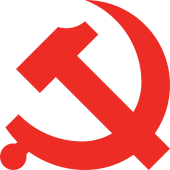
Back المؤتمر الوطني للحزب الشيوعي الصيني Arabic Congrés Nacional del Partit Comunista de la Xina Catalan Sjezd Komunistické strany Číny Czech Parteitag der Kommunistischen Partei Chinas German Tutlanda Kongreso de la Komunista Partio de Ĉinio Esperanto Congreso Nacional del Partido Comunista de China Spanish کنگره ملی حزب کمونیست چین Persian Congrès national du Parti communiste chinois French הקונגרס הלאומי (סין) HE Kongres Nasional Partai Komunis Tiongkok ID
National Congress of the Chinese Communist Party 中国共产党全国代表大会 | |
|---|---|
 | |
| Type | |
| Type | |
Term limits | Five years |
| Leadership | |
Authority | |
Jurisdiction | |
| Meeting place | |
 | |
| Great Hall of the People Beijing, China | |
 |
|---|
|
|
The National Congress of the Chinese Communist Party (Chinese: 中国共产党全国代表大会; pinyin: Zhōngguó Gòngchǎndǎng Quánguó Dàibiǎo Dàhuì; literally: Chinese Communist Party National Representatives Congress) is a party congress that is held every five years. The National Congress is formally the highest body within the Chinese Communist Party (CCP). Since 1987 the National Congress has been held in the months of October or November. The venue for the event, beginning in 1956, is the Great Hall of the People in Beijing. The Congress is the public venue for top-level leadership changes in the CCP and the formal event for changes to the Party's Constitution. In the past two decades the National Congress of the CCP has been pivotal at least as a symbolic part of leadership changes, and therefore has gained international media attention.
The Congress formally approves the membership of the Central Committee, a body composed of the top decision-makers in the party, state, and society. In practice, however, only slightly more candidates than open seats are nominated for the Central Committee, limiting the Congress's role in the selection process to eliminating very unpopular candidates. Each five-year cycle of the National People's Congress also has a series of plenums of the Central Committee which since the mid-1990s have been held more or less regularly once every year.
From the mid-1980s to the late-2010s, the CCP has attempted to maintain a smooth and orderly succession and avoiding a cult of personality, by having a major shift in personnel every ten years in even number party congresses, and by promoting people in preparation for this shift in odd number party congresses.[citation needed] In addition, as people at the top level of the party retire, there is room for younger members of the party to move up one level. Hence the party congress is a time of a general personnel reshuffle, and the climax of negotiations that involve not only the top leadership but practically all significant political positions in China. Because of the pyramid structure of the party and the existence of mandatory retirement ages, cadres who are not promoted at a party congress are likely to face the end of their political careers.[citation needed]
Similar to the practice of the NPC, the delegates to the Congress are formally selected from grassroots party organizations, and like the NPC, there is a system of staggered elections in which one level of the party votes for the delegates to the next higher level. For the National Congress, delegates are elected by the CCP's provincial level party congresses or their equivalent units in a selection process that is screened and supervised by the party's Organization Department as directed by the Politburo Standing Committee (PSC).[1]
- ^ Li, Cheng (2012). "Preparing For the 18th Party Congress: Procedures and Mechanisms" (PDF). China Leadership Monitor (36). Hoover Institution. Archived (PDF) from the original on November 4, 2016. Retrieved October 18, 2017.